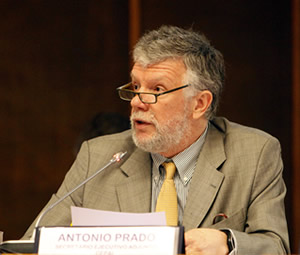ECLAC Highlights the Importance of Raúl Prebisch's Legacy in Tackling 21st Century Challenges
A new website was launched to promote discussion and research about the thinking of the renowned Argentine economist.

(5 November 2012) The thinking of Raúl Prebisch, one of the region's most important economists, remains highly influential and an analysis of his legacy provides significant lessons for tackling the challenges of the 21st century, according to the academics and experts meeting today at the headquarters of the Economic Commission for Latin America and the Caribbean (ECLAC) in Santiago, Chile.
Prebisch, the Argentine economist born in 1901, was one of the main inspirations for ECLAC. He was Executive Secretary from 1950 to 1963, Director of the Latin American and Caribbean Institute for Economic and Social Planning (ILPES) and founding Director of the CEPAL Review until the year of his death in 1986.
In order to analyse his work and thinking, the seminar on Raúl Prebisch and 21st century challenges, organized by ECLAC and the Canadian International Development Research Centre (IDRC), was opened today.
The seminar was opened by Antonio Prado, Deputy Executive Secretary of the United Nations regional commission, and was attended by representatives of universities and research centres from Argentina, Brazil, Colombia, Mexico and Uruguay, as well as other figures from economic academia and the widow of the great economist himself, Eliana Díaz de Prebisch.
At the opening, Antonio Prado outlined the characteristics of the project that gives the seminar its name, which also includes the launch of a website detailing Prebisch's long career and providing a platform for academic exchange and discussion among various institutions interested in his legacy, with sponsorship from IDRC.
According to Mr. Prado "We want to promote discussion, research and teaching on the current status and future prospects for the key issues of the thinking of Prebisch in particular and ECLAC in general".
Federico Burone, Director of the IDRC Regional Office for Latin America and the Caribbean gave a videoconference from Montevideo, Uruguay, stating that the new Raúl Prebisch website launched today would provide a space for experts to exchange knowledge and will make it possible to rethink the ideas of the renowned economist in a way that constitutes a major qualitative step forward.
The Deputy Executive Secretary of ECLAC used his address to explain some of the reasons why the Commission was looking back at one of its founders at this stage in the 21st century.
"Firstly, the development of Latin America and the Caribbean remains a challenge. Secondly, there is still a need to strengthen regional unity. Thirdly, we believe that there is an ongoing need to disseminate and deepen structuralist thinking in order to, as dreamed of by Prebisch, generate strategic visions, analyses and recommendations from and for the region around the major challenges for its economic, social and environmental development".
For the two days of the seminar, participants will discuss the role of universities and development in Latin America, the region in the new international economic order, ECLAC in the 21st century and the challenges of development and of teaching economics and macroeconomics for development.
In addition, ECLAC experts will give a special presentation on the document Structural change for equality: An integrated approach to development, which was launched by the Commission at its most recent session in El Salvador.
Other presenters at the seminar include many university authorities from the region, such as the Chancellor of the University of the Republic (Uruguay) Rodrigo Arocena, Chancellor of the Federal University of Minas Gerais (Brazil) Clelio Campolina, Executive Secretary of the Union of Latin American Universities (UDUAL) Roberto Escalante, Chancellor of the University of Rosario (Argentina) Darío Maiorana and Vice-Chancellor of the National University of Colombia, Jorge-Iván Bula Escobar.
The Deputy Executive Secretary of ECLAC concluded by saying the following "ECLAC is faithful to the Prebisch legacy, and is an organization that is constantly seeking to renew itself by continually studying changing reality. In the current world context, amidst a crisis in several developed countries, Latin America and the Caribbean has a key role and an opportunity to establish a new development path with equality. This vision can only be analysed, translated and transmitted to new generations if we work together".
Any queries should be sent to the ECLAC Public Information and Web Services Section.
E-mail: prensa@cepal.org; Telephone: (56 2) 210 2040.
Follow us on: Twitter, Facebook, Flickr and YouTube.
Related content
Encuentro de Presentación del sitio web del Proyecto "Raúl Prebisch y los desafíos del siglo XXI con redes académicas"
Por Antonio Prado, Secretario Ejecutivo Adjunto de la CEPAL
Country(ies)
- Latin America and the Caribbean
Contact
Public Information Unit
- prensa@cepal.org
- (56 2) 2210 2040